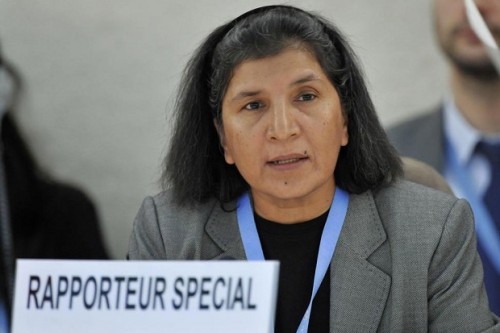UN expert breaks global silence on rape of young virgin girls in Iranian prisons
Justice for Iran (JFI), London (28 October 2013) – On 24 October, UN Special Rapporteur on Violence Against Women, Professor Rashida Manjoo, introduced a comprehensive report, entitled Pathways to, conditions and consequences of incarceration of women. The report was officially presented at the UN General Assembly session and was followed by efforts highlighting the need to improve knowledge and skills pertaining to rights of women in the criminal justice system.

The report highlights the causal relationship between acts of violence against women and cases involving incarceration. It further illustrates how human rights abuses and violence prior to, during, and after imprisonment affects women of all ages and cultures. In her report, Ms. Manjoo refers to the standards set by the UN Bangkok Rules that are designed to protect women from victimization, upholding adequate care and facilities during incarceration, and proper post-prison rehabilitation mechanisms.
By referring to the JFI report entitled Crime and Impunity: Sexual Torture of Women Prisoners in Islamic Republic Professor Manjoo’s report acts as a landmark in highlighting the plight of women in Iranian prisons. It identifies Crime and Impunity as a source that has “uncovered cases of rape of female political prisoners in the Islamic Republic of Iran throughout the 1980s, including the rape of young virgin girls before execution, forced marriages and other forms of sexual violence, some of which continues today.”
Ms. Manjoo’s report further identifies JFI’s research pointing to various forms of political activism among Iranian women which Islamic Republic authorities use as means of harassment, arrest and detention. It also highlights JFI’s series of interviews and witness statements revealing the Islamic Republic’s unprecedented policy of reported rape of virgins prior to execution, in addition to forced marriages and other forms of sexual, physical and mental violence as part of state policy and prison regulation affecting thousands of women in Islamic Republic prisons since 1979 and continuing to this day. Finally it refers to JFI’s work identifying the use of psychological abuse as a means of branding and humiliating the dignity of the prisoners, extracting private details of their sex life and as a means of obtaining false confessions.
Following the official announcement of this report by the United Nations Press this morning, JFI Co-Director, Shadi Amin, stated: “This report marks the first time that the issue of raping virgin girls in Iranian prisons is formally acknowledged at the UN level. The report also shows various ways in which Islamic Republic authorities have subjected women to discriminatory, abusive and violent treatment as part of state policies designed to mistreat Iranian citizens and prisoners.”
She added: “JFI will continue its efforts to seek justice and reparation for women who have suffered in Islamic Republic prisons through its investigative reports, appeals to relevant UN authorities and demanding Islamic Republic officials to live up to their responsibility of refining national codes that reflect universal human rights and protect the dignity and persons of Iranian women. The main aim of JFI in these efforts lies in the all-important process of holding perpetrators of such crimes against women prisoners accountable for their decisions and actions.”


